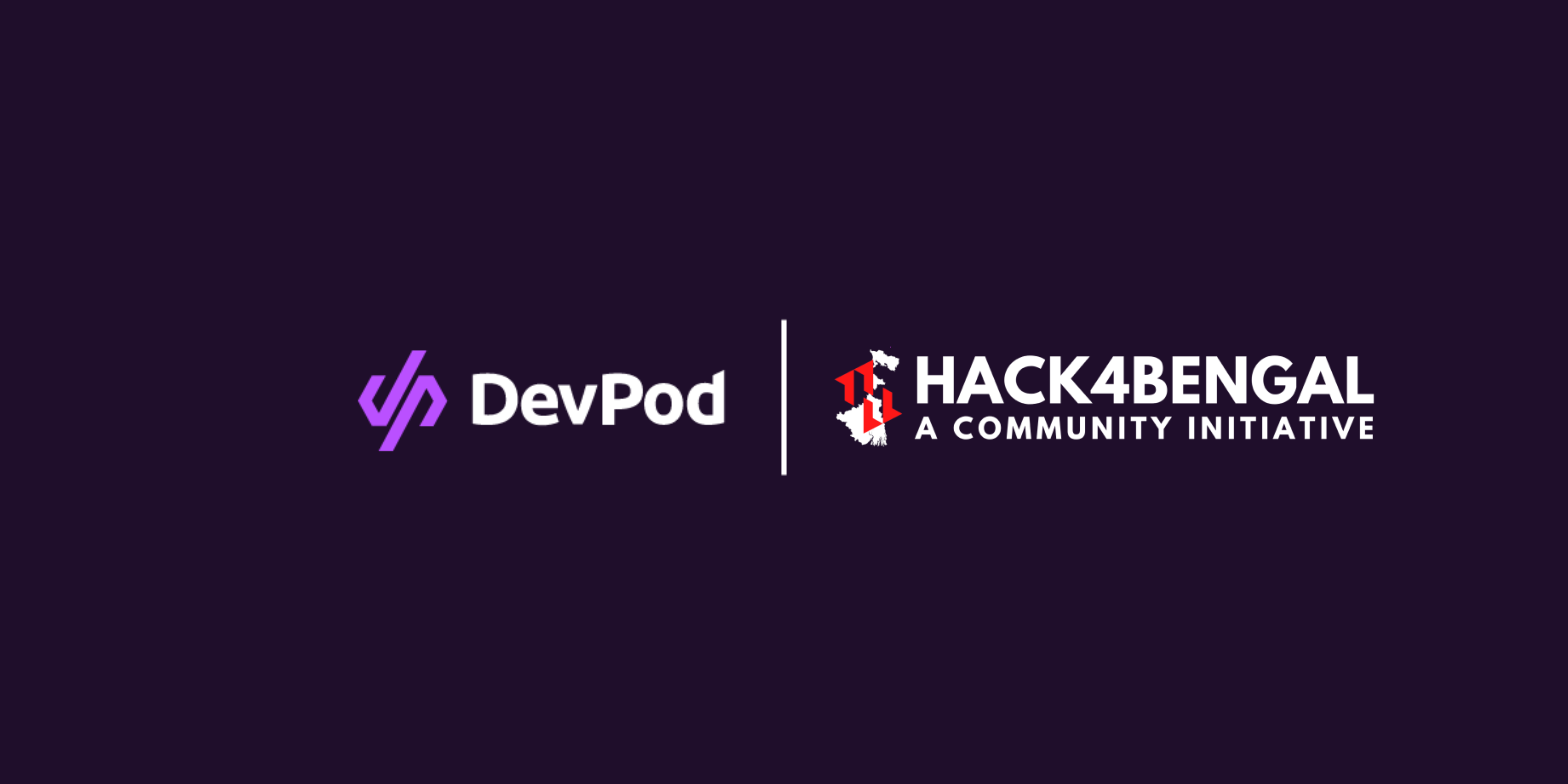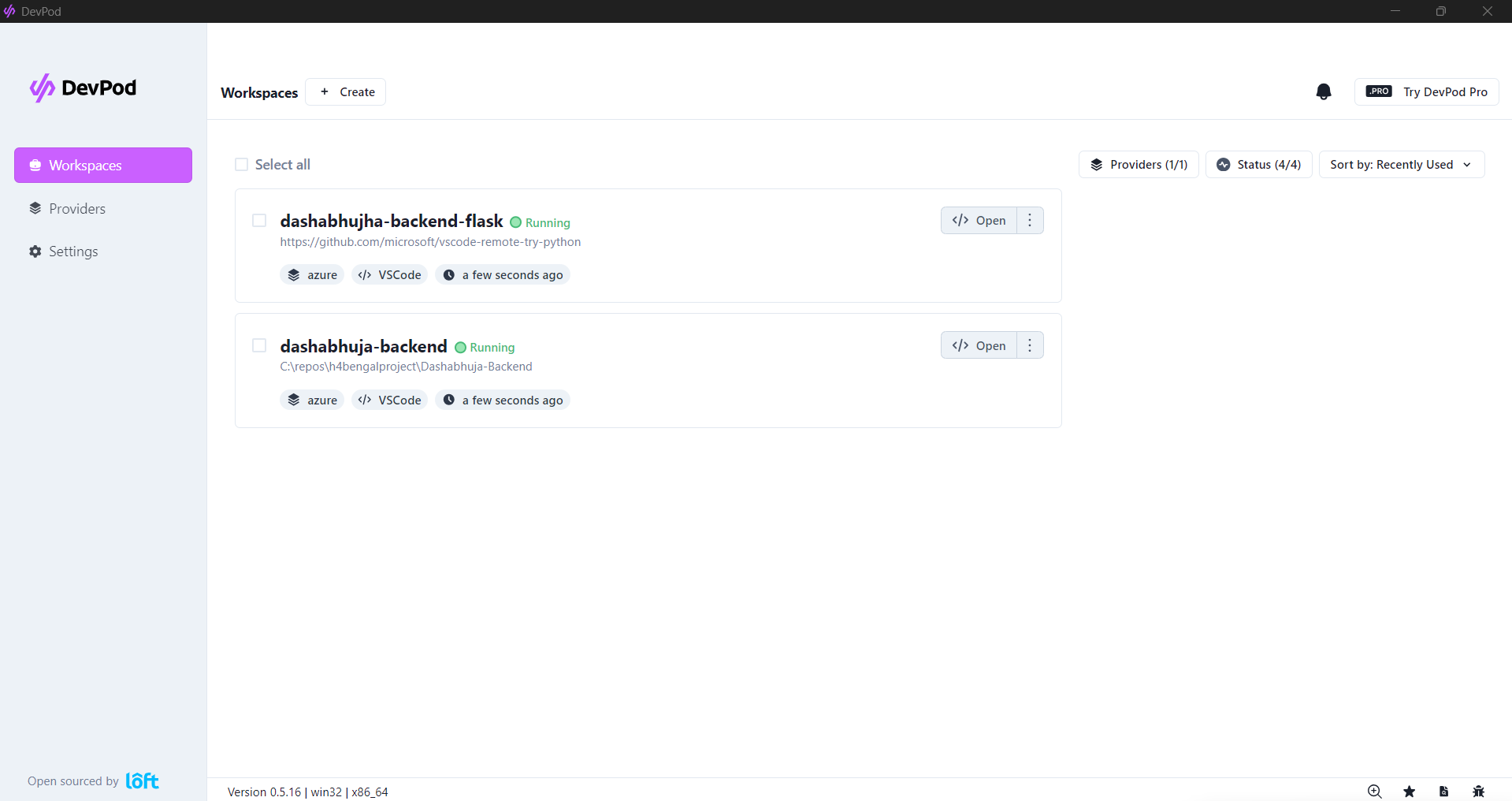From Setup to Success: How DevPod Transformed Our Hackathon Project
 Baivab Mukhopadhyay
Baivab Mukhopadhyay
Participating in Hack4Bengal 3.0 was an incredible experience, made even more seamless by using DevPod, a powerful open-source development tool. Launched in May,2023 and already amassing over 8.4k stars on GitHub, DevPod stands out for its cost efficiency and flexibility. It allows developers to create consistent development environments either locally or in the cloud, all while leveraging the same devcontainers.json standard used by Codespaces.
This blog will delve into my experience using DevPod at Hack4Bengal 3.0, showcasing its features, benefits, and the positive impact it had on our project.
About DevPod
DevPod is an open-source tool designed for creating reproducible development environments, known as Dev-Environments-As-Code. Each environment is specified using a devcontainer.json file and runs in a separate container. DevPod offers unparalleled flexibility, allowing these containers to be deployed locally, on any reachable remote machine, or in public or private clouds. Unlike other solutions like Codespaces, which restrict control over the environment's location, DevPod empowers developers to run their environments anywhere—be it Docker, Kubernetes, or custom providers.
In a hackathon setting, DevPod shines by enabling rapid setup and consistent environments for all team members, regardless of their individual machine setups. This ensures that everyone works in a unified environment, reducing setup time and allowing participants to focus on innovation and coding. Its flexibility and control mean that teams can quickly adapt to the specific needs of their projects, whether they're working on local machines or utilizing cloud resources.
Reproducibility: Environments are defined using
devcontainer.json, ensuring consistency across setups.Flexibility: Supports local, remote, and cloud-based environments.
Control: Unlike other platforms, it gives complete control over the development environment.
Extensibility: Custom providers can be developed if needed.
Versatility: Works with any programming language and integrates seamlessly with local IDEs.
DevPod is a powerful tool for developers looking to maintain control over their development environments while benefiting from the flexibility of running them anywhere. For more information check out the official guide.
My Experience with DevPod
Initial Setup
Setting up DevPod for our project during Hack4Bengal 3.0 was a pivotal decision that significantly impacted our development process. With our project focusing on creating an e-commerce platform for women to offer services and sell handmade crafts, alongside a critical feature for reporting crimes, our team comprised two backend developers, a frontend specialist, and a UI/UX designer. The initial setup with DevPod involved selecting templates tailored to our needs, opting for Azure as our cloud provider, integrating our GitHub repository for version control, and configuring our preferred IDE. Within moments, DevPod orchestrated the creation of virtual machines and establishment of our development environment. This streamlined approach minimized setup time and allowed us to dive straight into coding and collaborative development.
Key Features
DevPod’s standout features played a pivotal role in enhancing our productivity and overcoming various challenges throughout the hackathon:
Reproducibility and Isolation: Each team member had their dedicated workspace, ensuring that development efforts remained isolated and focused. This setup proved crucial as it prevented conflicts and streamlined collaboration across multiple servers and technologies.
Cost Efficiency: Leveraging Azure VMs through DevPod offered significant cost savings, particularly during the intense 36-hour hackathon period. The auto-shutdown feature intelligently managed cloud resources, reducing costs by powering down inactive environments automatically.
GitHub and Docker Integration: Seamless integration with GitHub and automated Docker credential injection streamlined our workflow. This integration proved invaluable during critical moments, such as rapidly deploying Docker images for hosting purposes.
Performance: Utilizing Azure’s powerful CPUs via DevPod enabled us to efficiently run resource-intensive tasks, such as local uncensored LLM for crime case summarization. This capability ensured that our application's AI-driven features operated swiftly and effectively. In comparison to alternatives like CodeSpaces, DevPod provided superior performance capabilities crucial for our project’s success.
Extensibility: DevPod’s open-source nature allowed us to customize and extend our development environment seamlessly. This flexibility was particularly beneficial as we integrated specialized AI functionalities and customized workflows tailored to our e-commerce and crime reporting platform.
Security: DevPod’s robust security features ensured that our sensitive data and project configurations were protected. This was crucial given the nature of our project, which involved handling crime reports and personal information securely.
Collaboration Tools: Built-in collaboration tools facilitated real-time communication and streamlined teamwork. This was essential for coordinating efforts between backend development, frontend design, and UI/UX enhancements throughout the hackathon.
Use Case in the Hackathon
During Hack4Bengal 3.0, DevPod proved indispensable in navigating challenges and enhancing our development workflow:
Multi-Server Development: Our project required simultaneous development on Flask (Python) and Node.js (JavaScript) servers. DevPod simplified this process by eliminating the need for each team member to configure environments individually. Instead, we leveraged DevPod’s reproducible environments, allowing us to focus on coding without worrying about compatibility issues.
Insight: For our frontend developer, who had limited experience with Flask servers, DevPod’s isolated environment provided a safe space to experiment and learn without affecting the backend setup.

Bandwidth Optimization: Working from the hackathon venue presented bandwidth challenges. DevPod's integration with Azure ensured that our SSH connections remained stable and efficient, even when internet speeds fluctuated. This reliability was crucial as it allowed us to maintain a consistent workflow and meet our project milestones without interruption.
Personal Story: During a critical phase, our team faced network instability. Thanks to DevPod’s cloud-based setup, we continued development seamlessly while others struggled with local environment issues.
Disaster Recovery and Security: At one point, an essential file was accidentally deleted. DevPod’s built-in disaster recovery features, such as the manifest file, allowed us to quickly restore the file and resume work without losing valuable time or progress.
Insight: This incident highlighted DevPod’s reliability and data protection capabilities, reassuring our team and enhancing our confidence in using cloud-based development environments.
Collaboration and Team Dynamics: DevPod’s intuitive setup process and customizable environment settings facilitated smooth onboarding for all team members. This streamlined collaboration and encouraged a proactive approach to problem-solving, ultimately contributing to our project’s success and recognition as top 10 finalists.
Benefits of Using DevPod
Efficiency
Streamlined Setup: Quick initial setup with pre-configured templates, allowing immediate focus on coding.
Reproducible Environments: Uniform setups across team members, eliminating environment inconsistencies.
High Performance: Leveraged Azure's powerful CPUs to handle resource-intensive tasks efficiently.
Cost Management: Auto-shutdown feature reduced cloud costs by managing inactive environments automatically.
Resource Optimization: Efficient use of cloud resources, reducing costs and improving performance compared to alternatives like CodeSpaces.
Collaboration
Isolated Workspaces: Each team member had a dedicated workspace, preventing conflicts and ensuring smooth collaboration.
Real-Time Tools: Built-in collaboration tools and real-time communication features enhanced team coordination.
Learning and Experimentation: New team members could experiment in isolated environments without disrupting the project.
Network Stability: Cloud-based setup maintained productivity despite local network issues at the hackathon venue.
Flexibility
Multi-Language Support: Easily managed both Flask (Python) and Node.js (JavaScript) servers.
Integration with GitHub and Docker: Automated version control and container management streamlined workflows.
Security and Recovery: Robust security features and quick file recovery ensured data protection and minimized disruptions.
Customizable Environments: Support for various base images (Linux, Windows, macOS) allowed tailoring to project needs.
Challenges and Learnings
Hurdles
Initial Network Issues: We faced bandwidth challenges at the hackathon venue, but DevPod's cloud-based setup maintained stable connections, allowing us to continue development without disruption.
File Deletion Incident: A critical file was accidentally deleted, but DevPod's manifest file feature enabled quick recovery, saving us from potential delays.
Learning Curve
Adaptation to New Tools: While there was a brief learning curve for some team members unfamiliar with cloud-based development environments, DevPod's intuitive interface and comprehensive documentation facilitated a smooth transition.
Cross-Technology Integration: Managing both Flask and Node.js servers required some initial adjustment, but DevPod’s reproducible environments and support for multiple languages made this process straightforward.
Conclusion
Overall Impression
Our experience with DevPod at Hack4Bengal 3.0 was overwhelmingly positive. DevPod’s efficiency, collaborative features, and flexibility significantly boosted our productivity and streamlined our workflow. It helped us manage complex multi-server development, optimize limited bandwidth, and recover from potential setbacks seamlessly. These capabilities were instrumental in our project’s success and contributed to us being named top finalists in the hackathon.
Future Use
We definitely plan to use DevPod in future projects and hackathons. Its ease of setup, robust performance, and cost-effectiveness make it an ideal choice for any development team. The platform’s ability to support diverse technologies and integrate seamlessly with tools like GitHub and Docker ensures that we can tackle a wide range of projects efficiently and effectively.
Call to Action
Try DevPod for Yourself: Discover the benefits of using DevPod for your development projects. Learn more and get started with DevPod or Getting Started with DevPod on Google Cloud
Share Your Experience: Have you tried DevPod? Share your experiences or ask questions in the comments below. We’d love to hear from you and discuss how DevPod can enhance your development workflow.
Subscribe to my newsletter
Read articles from Baivab Mukhopadhyay directly inside your inbox. Subscribe to the newsletter, and don't miss out.
Written by

Baivab Mukhopadhyay
Baivab Mukhopadhyay
I am passionate Devops engineer. Who loves to tickle around with go and ai stuffs.